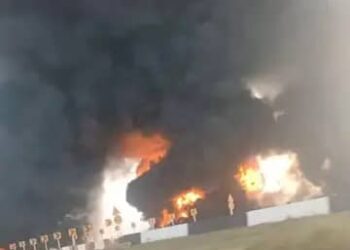By Awaal Gata
The Satellite Towns Development Agency (STDA) was established by the Sixth Schedule of the Subsidiary Legislation of the Federal Capital Territory Act, No. 1 of 2004 as an administrative creation and intervention agency of the Federal Capital Development Administration.
As its name implies, it is saddled with the responsibility of planning and developing the satellite towns within the Federal Capital Territory (FCT).
Structurally, four areas are designated as satellite towns in Kuje Area Council, they are Kusaki/Yanga, Kuje, Rubochi, and Abuja South West.
In Gwagwalada Area Council, five areas are designated. They are Anagada, Dobi, Gwagwalada, Zuba and Dei-Dei.
Bwari Area Council has two, which are Kubwa and Bwari. In Abuja Municipal Area Council (AMAC), there is Karshi, Gosa, Abuja North-west, Karu and Nyanya. The rest are Abaji and Kwali Area Councils.
The law also permits the Minister of FCT to designate any other part of the territory a satellite town.
Following the creation of the Agency and its awesome mandates, people living in the satellite towns were given the hope that the lack of development that has been hitting them for years would be a thing of the past. However, years after the creation, residents of the towns are complaining that they have not felt any positive impact from it.
Some of the stark examples given by some of the residents that spoke to our correspondents were the lack of social amenities that are prevalent in the areas.
Development of plots are done without complying to the laws, roads are bad, no potable water, electricity, complete healthcare centres and worse of all, the sanitation systems are nothing to write home about.
Talking about the roads, the people living in Nyanya have all sorts of gory stories to tell about the troubles they are facing because the roads that link to their houses are bad.
“I don’t take my car to my house, I leave it at a friend’s because the road that leads to my house is bad and unmotorable. It was manageable at a time but after sometime, it got unmotorable,” Mr. Eze Markus, 36, told our correspondent.
The story is not different in other areas. In Gwagwalada, no impact has been made by the Agency, it is rather leaving everything on the area council, which is axiomatically riddled with corrupt officials. In the town, which is quite expansive, the Area Council authority has been striving to expand the township roads for many years without success, “because of lack of funds.”
In an interview with our correspondent, Mohammed Bala Ismaila, a resident of the town complained that: “I don’t really know the work of the STDA, the areas designated as satellite towns are being left in the hands of the Area Councils that always complain of lack of funds. I know to an extent that the officials of the councils are corrupt but to be a bit fair, a place like Gwagwalada is too big for the council to develop, so that is why we have the STDA but it seems not to be active. It take cares of only wastes, haphazardly.”
Gwagwalada is also suffering from incessant lack of electricity, as most parts of the town stay without power for weeks. The same thing applies to Zuba and other designated areas.
What is even currently becoming a major source of concern to the residents is lack of good sanitation system. In Zuba, residents that spoke to our correspondent confirmed their readiness to stop dumping refuses anyhow, but complained that they had not been given alternatives.
Caroline Ezemaka, a housewife that is resident in the town, said if there were government’s designated refuse dump sites, there would not have been “anyhow dumping because we all know its health implications.”
She however questioned a statement credited to the Minister of State for FCT, Oloye Olajumoke Akinjide, recently that waste management in the satellite towns will improve as 22 new concessionaires were charged with that responsibility.
Blueprint had quoted the Minister as saying: “The selection process for the licensees have been done in line with the National Procurement Act. The administration has shortlisted 22 concessionaires and award letters have been issued to them to start as soon as possible, adding that the administration, through the Satellite Towns Development Agency (STDA) would acquire heavy equipment and trucks as part of measures to ensure effective waste evacuation in the area councils and satellite towns.
“The STDA is already providing infrastructure in the area councils and also supporting the councils in the area of capacity building in line with Mr. President’s Transformation Agenda.”
However, Ezemaka noted she had never seen trucks collecting wastes at Zuba or Bwari, where she visits frequently.
“Since I don’t see the trucks in these places, I believed they don’t work in other satellite towns,” she noted.
She was however with the view that since the STDA doesn’t make any impact on the towns, it should be scrapped and its power given to the area councils.
Mr. Bitrus Dogari, a resident of Kuje, was with the same view, saying: “the STDA is totally useless. We have never felt its impact in Kuje. The budget it is getting should be shared among area councils.”
But in his response, Mr. Tukur Bakori, the Director of the Agency, argued that some people were only complaining about the Agency’s non-performance in waste management as part of a plot to evade meeting their obligations.
“If we have not been managing waste in the satellite towns well, the places would have become uninhabitable by now. But we observe that residents of the satellite towns are reluctant to pay their sanitation bills.
“The only bills Nigerians prefer to pay are the pre-paid electricity bills and telephone charge but we have already finalised plans to prosecute defaulters through our mobile courts,’’ he said.
Bakori, however, solicited the support of the residents of satellite towns for the STDA to enable the agency to give excellent service delivery.



